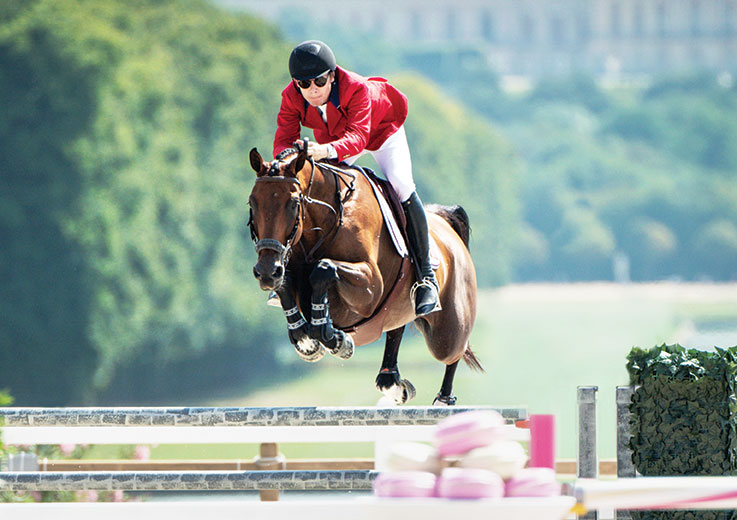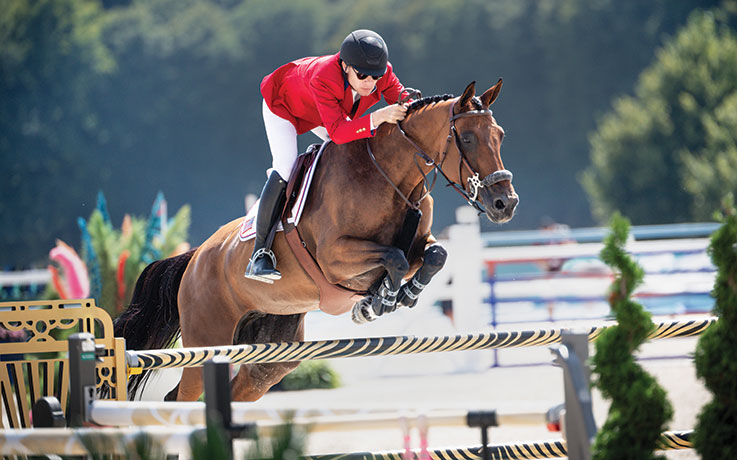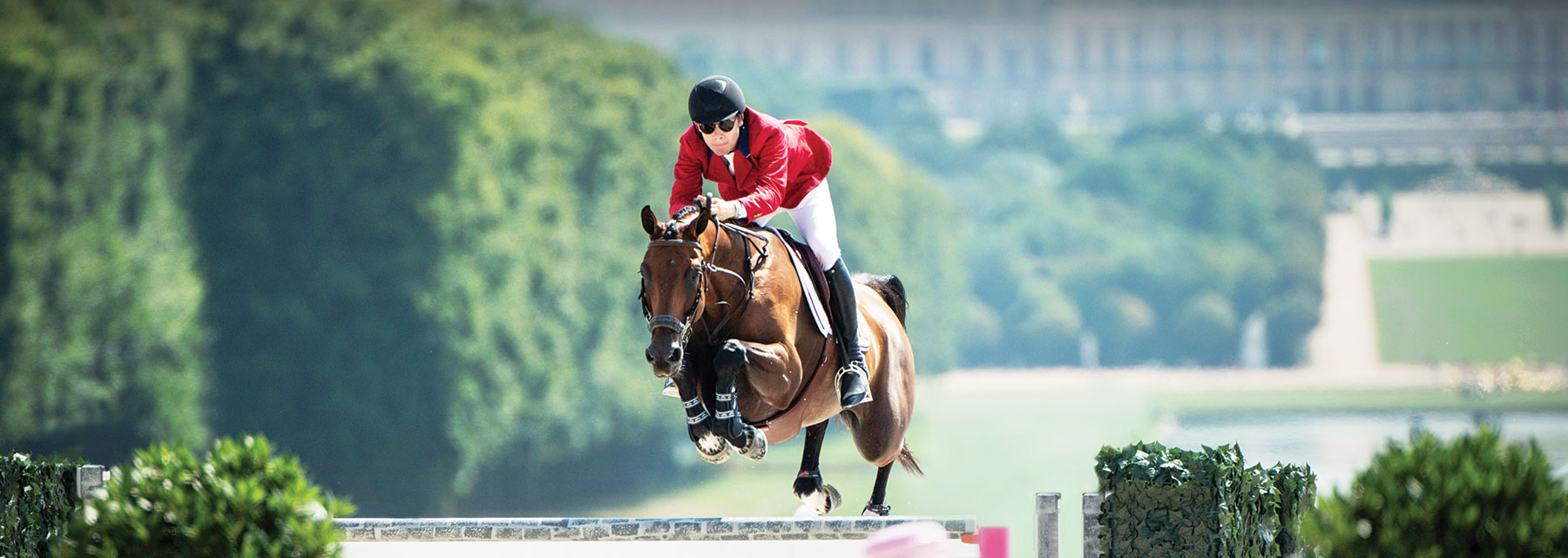Karl Cook’s journey to the 2024 Olympic Games to represent Team USA in Paris is a compelling narrative of dedication, meticulous planning and the unique synergy between rider and horse. As the show horse manager at Pomponio Ranch South and a Platinum Performance® client since 2012, Cook has made significant contributions to show jumping, in and out of the ring. With a recent silver Olympic medal to his name, his journey exemplifies the intricate blend of preparation, talent and sometimes sheer serendipity required in high-level equestrian sports. His experience at the Paris Games not only highlights his talent but also offers valuable insights into the complexities of competing at the highest level.
The Alternate: The Road to the Olympics
Cook’s Olympic quest was fraught with challenges. His horse Kalinka Van’t Zorgvliet, or “Kalinka,” was to be his Olympic leading lady, but an injury led to a late change in plans. He had yet to establish a consistent performance record with his newer mount Caracole de la Roque, or “Cara,” but U.S. Chef d’Equipe Robert Ridland kept him on the team. Despite early setbacks with Cara, the duo showcased a stronger partnership in the months leading up to the Olympics, with a solid showing in the Rolex Grand Prix CSIO5* of Rome in May and of La Baule, France, in June.
Being selected as an alternate to Team USA is a unique and challenging position. Cook embraced the role and maintained a disciplined and methodical approach, staying prepared for a potential call-up. The 33-year-old described his mindset as focusing on what he could control and being ready for the opportunity.
The Search for the Perfect Horse
Karl Cook’s search for the ideal horse goes beyond scouting for top athletes; it involves patience, strategy and a touch of luck. When he acquired Kalinka Van’t Zorgvliet, aka “Kalinka,” he anticipated a high-level 1.45m speed horse. Yet, Kalinka surpassed expectations, revealing a depth of talent beyond initial assessments. Cook underscores the unpredictable nature of equestrian sport, where a horse’s ultimate potential may exceed or fall short of initial evaluations.
Conversely, his experience with Caracole de la Roque, or “Cara,” began with challenges. He admits to a lack of inherent compatibility between them with a communication barrier that made standard cues ineffective. Although Cara came with quite a résumé and innate talent, they just needed to connect. Having now forged a strong partnership, Cook points out that talent and potential are insufficient if a connection between horse and rider can’t be formed.
A key trait Cook values in both mares is their mental attributes. The horse’s mindset to him is more crucial than physical attributes like size and stride. In his experience, a horse with the right brain can overcome any physical shortcomings.
The Call-Up: Thriving on the Pressure

On the morning of the Olympic jumping team qualifier, Karl Cook was informed he would be stepping in for teammate Kent Farrington, joining McLain Ward and Laura Kraut in competition representing Team USA.
On the morning of the Olympic jumping team qualifier, Cook learned he would be stepping in for teammate Kent Farrington.
Karl’s reaction was pragmatic; he adjusted his attire and got ready to compete. From the start of the year, his goal was to compete, so there was no hesitation. “We were empowered by the opportunity, and everyone came together and put us in a place where, if we were called, we’d be ready,” he said. His goal was no small feat: consistency. “It is hard to stay disciplined and maintain a high level of consistency every day, especially at this level,” he said.
The pressure of the Olympics is immense, but Cook views it as an essential motivator, believing that pressure sharpens focus and enhances performance. “It is uncomfortable to have pressure, but it is necessary,” he adds. “Embrace it, and you’ll be in a place to handle it.” This mindset was crucial during the Games, allowing him to remain focused and composed.
Cook’s ability to recognize and adapt to patterns within the course was a key factor in his performance. Recognizing patterns helped identify key elements and anticipate challenges, so you can better strategize and adapt to them in real time. For a seasoned rider like Cook, pattern recognition is not just a skill but a fundamental aspect of navigating the complexity of the jump courses at the Olympic level with precision and confidence.

PHOTOS BY SHANNON BRINKMAN
“Everything for us starts with nutrition. Until we get that right, we don’t move on to the next step. It’s that first pillar that you can’t shortcut.”
— Karl Cook, 2024 Olympic Team Silver Medalist
Nutrition’s Role in Karl Cook’s Program
Nutrition forms the cornerstone of Karl Cook’s training regimen. He views it as fundamental, “Everything starts with nutrition. Until we get that right, we don’t move on to the next step.” Cook’s meticulous approach includes carefully sourcing and feeding hay as the primary dietary component. He illustrates this with an example of how they identified a problem with their hay supply and took steps to resolve it, ensuring consistent and optimal nutrition for his horses.
Winning Team Silver
In the team competition, the format was intense, with 20 teams cut down to 10 after the first round. The scoring system required consistency, as there were no drop scores, meaning every fault counted. Cook’s focus was on delivering clear rounds and contributing to the team’s overall performance. The U.S. team included six-time Olympian McLain Ward and four-time Olympian Laura Kraut. The team’s strong showing in the first round set the stage for a successful second day. Cook conveyed that there was always a great team atmosphere, but, once the initial hurdles were cleared and it became evident that victory was within reach, the mood lightened considerably.
The second day of the competition was more challenging, with the course being significantly tougher. Despite this, the team secured a silver medal, an impressive achievement given the high level of competition. Cook also jumped clear and posted the fastest time for Team USA. He credited the team’s success to the strength of its members: Ward, Kraut and himself, offering that the individual skills and team dynamics were pivotal in achieving Olympic success.
Cook’s experience with winning the team silver was a whirlwind of emotions and realizations. Reflecting on the moment, Cook was so absorbed in the task at hand — jumping clear and watching his teammates — that he had little grasp of the overall standings. He remembers being intensely focused while Ward was jumping; his own movements mirroring the tension as he willed Ward to clear the jumps. When Ward succeeded, Cook hadn’t realized their podium placement until the team Chef d’Equipe announced that they were guaranteed a medal. Also, there was the further shock of winning silver — after initially thinking the trio would finish third. That experience was overwhelming.
Cook had moments of dissatisfaction with his own performance addressing his clipping of two rails in the individual medal round. Despite the disappointment, his contributions were undeniably outstanding. His efforts aboard Cara not only highlighted his individual prowess but also cemented his position as a valuable member of Team USA.
Care and Planning
Karl Cook’s philosophy, shared with Pomponio Ranch, is straightforward and profound: To unlock a horse's full potential, it is essential to establish an optimal program that caters to every aspect of their needs. He relies on a dedicated team in the barn, as well as veterinarians, farriers, massage therapists, etc. to provide integrated and specialized care.
Embracing the Olympic Experience
Competing at the Palace of Versailles was a surreal experience for Cook. He recalls the moment of riding on the pristine grounds, reflecting on the grandeur and uniqueness of the Olympic venue. He describes the Olympics as a unique atmosphere due to the extended duration, sequestered barns and the sheer scale of the event making it unparalleled to other events.
Olympic Village and were fortunate to stay in a hotel near the Château de Versailles. This allowed family and loved ones to stay with them. Cook acknowledges the importance of receiving support from loved ones. He appreciates the support from his wife, Mackenzie Drazan Cook, expressing “I’m extremely lucky.” He values their shared deep connection to the equestrian world and commends her for her professional commitments. Drazan Cook is a co-founder and CEO of MiResource and TEAM, which focus on supporting mental health.
Platinum Podcast
On the Heels of Paris: Karl Cook
From competing on the grounds of Versailles to Pomponio Ranch, hear Cook’s thoughts on his horses, the world of show jumping and the experience of a lifetime: the 2024 Olympics.
Listen NowLooking Ahead
As Cook looks to the future, he remains committed to continual improvement. Embracing new technologies and refining his approach, he aims to stay at the forefront of the sport. His mantra of relentless progression “keep getting better” drives his competitive and personal endeavors. Karl Cook’s Olympic journey is a testament to the blend of strategic planning, care and adaptability essential for success in equestrian sports. His dedication to the sport, paired with a deep understanding of horse care and team dynamics, will lead to remarkable achievements on the global stage. Undoubtedly, Cook is keen to represent the U.S. again at the 2028 Los Angeles Olympics. On home turf, he is well-positioned to make a strong impact and rise to the occasion.

